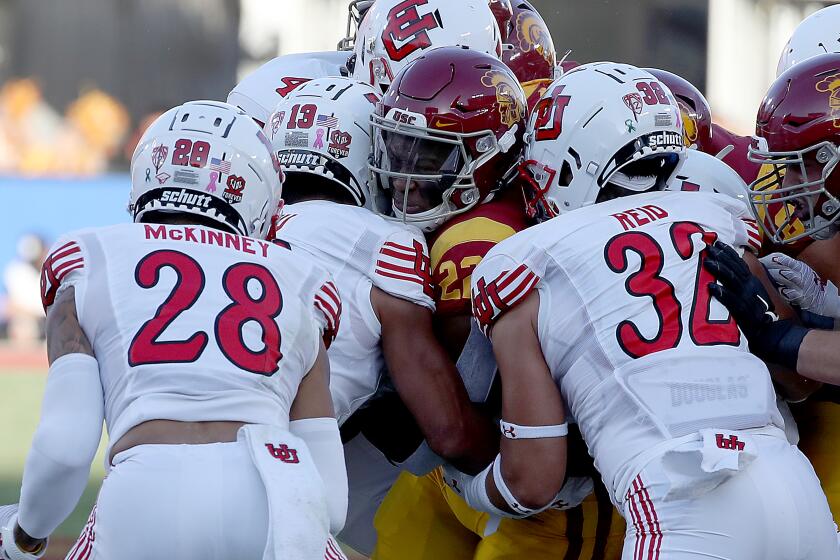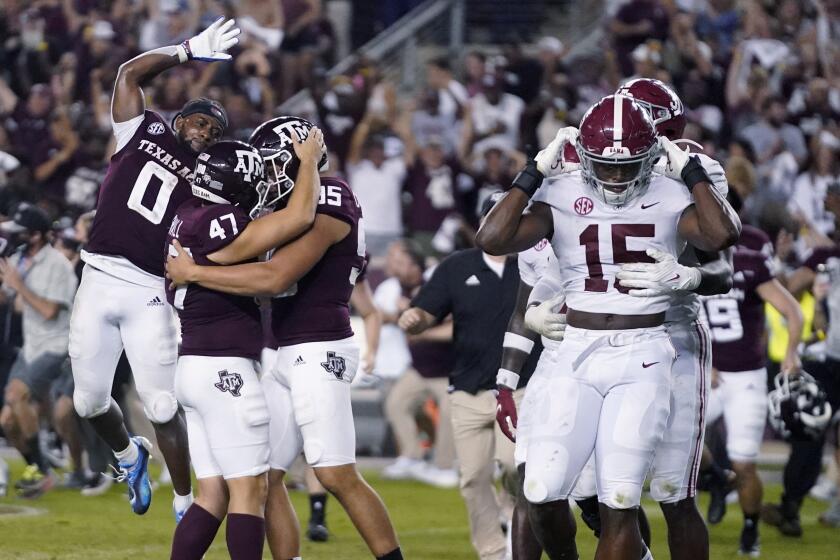USC suffers first loss to Utah in L.A. since 1916 and third straight defeat at Coliseum
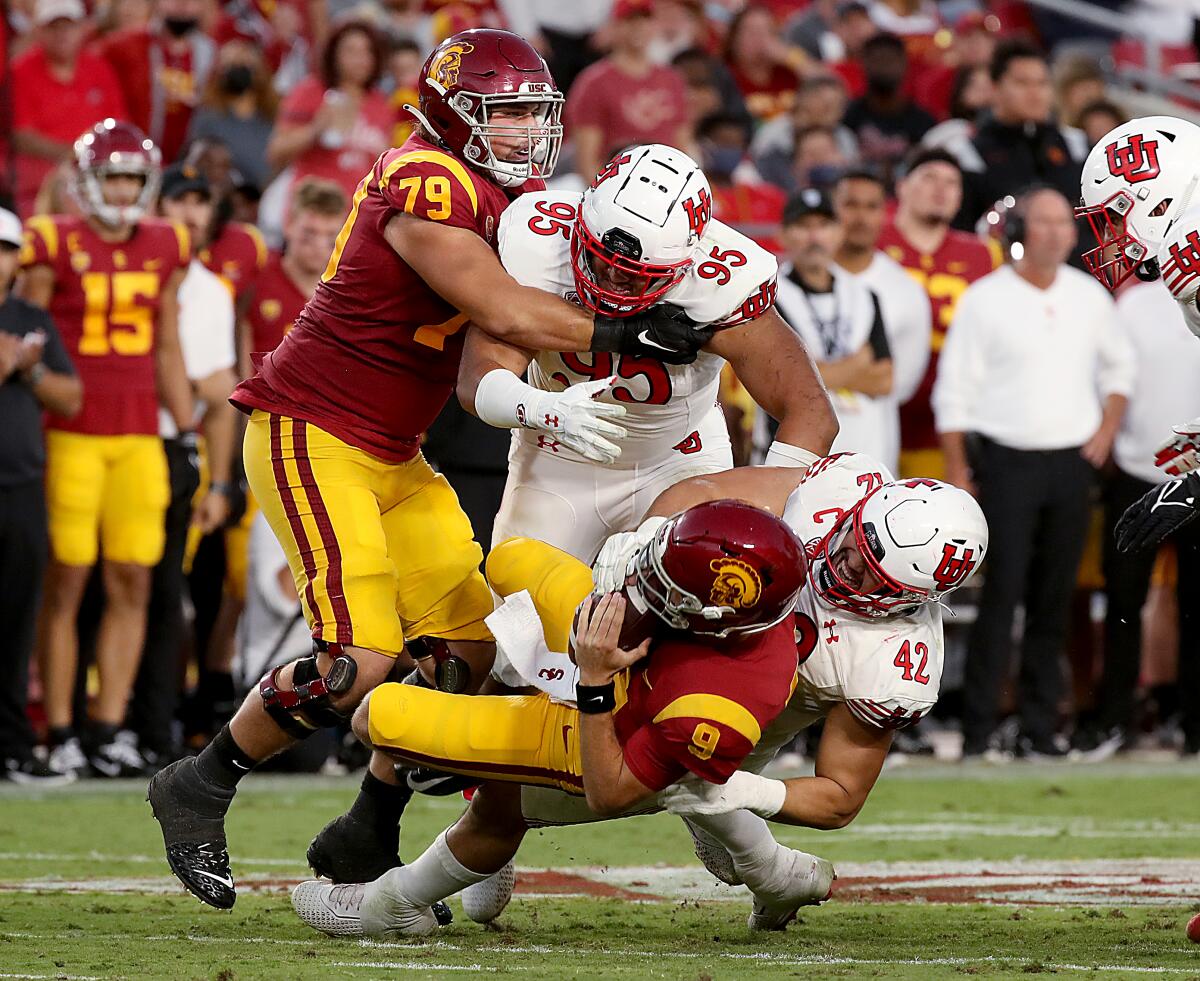
- Share via
In the fall of 1916, miles from where the L.A. Memorial Coliseum would later be constructed, USC welcomed Utah to its home field at Fiesta Park for the two schools’ second football matchup. The Trojans, who just a few years earlier had started using that nickname, were fresh off two shutout wins over the Sherman Institute and the Santa Fe Athletic Club and ready for their defense to dominate once again.
Instead, USC received a rude awakening from its future conference foe. Its defense was flattened by Utah in a loss apparently so demoralizing that for more than a century, USC refused to lose again to Utah in Los Angeles.
It took 105 years for history to repeat itself. But when it finally did Saturday in another humiliating loss — this time at the Coliseum, this time with the internet and high-definition television and the entire college football world watching — Utah was sure to pack a century’s worth of angst into the many punches it landed in a 42-26 win over USC that wasn’t anywhere as close as the final score indicated.
The most devastating of those blows came just before halftime, with the Trojans still clinging to hope they might avoid a third straight loss at home. On fourth and one, with 10 seconds left in the half, Utah quarterback Cam Rising handed off, before the ball was tossed back to him on a flea-flicker.
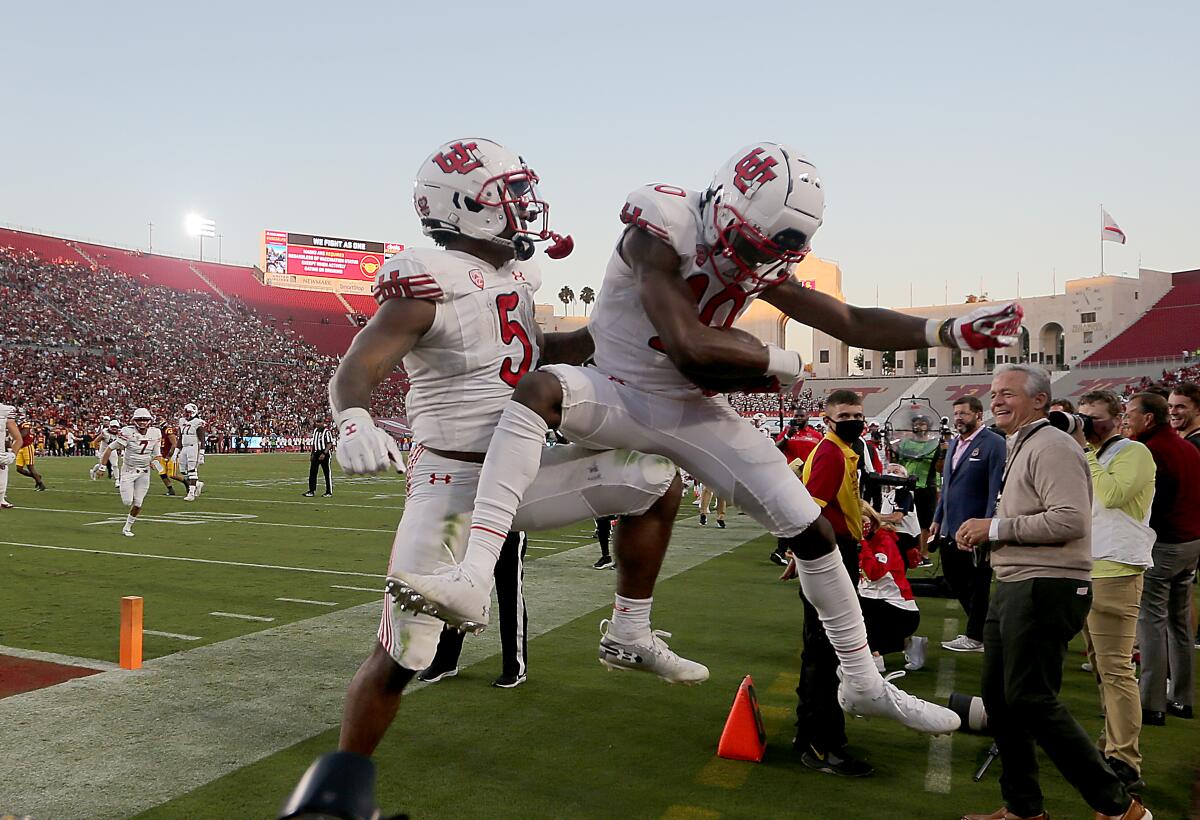
A discombobulated USC defense could only stare as Rising’s deep ball soared overhead and into the outstretched arms of Devaughn Vele for a 37-yard score. What was once a four-point lead heading into half ballooned to 11, leaving fans stunned and the team demoralized.
It got only worse from there, as USC (3-3, 2-3 Pac-12) fell at home for the third time in a row, all but ending its hopes of competition in the Pac-12.
“Three losses in the Coli, it’s not a good feeling at all,” center Brett Neilon said. “They all just kind of feel like deja vu.”
Not since 2001, in Pete Carroll’s first season as coach, have the Trojans had three conference losses this early in the season.
“We have to make sure we come into the bye and focus on us,” interim coach Donte Williams said. “We have a lot of things to clean up.”
USC suffered another setback Saturday, losing in a lopsided game to Pac-12 foe Utah at the Coliseum.
On Saturday, there were few positives to take away from USC’s historic loss, outside of the usual, jaw-dropping performance of wide receiver Drake London, who caught 16 passes for 162 yards and a touchdown, just one catch short of tying a USC record. Quarterback Kedon Slovis threw for 335 yards and a touchdown. USC turned the ball over just once. Beyond that, the Trojans would prefer their loss be lost to history.
In one of its ugliest performances of the season — a category that grows more competitive by the week — USC’s defense was embarrassed through the air, as Utah found open receiver after open receiver downfield.
“It’s like he couldn’t miss,” safety Isaiah Pola-Mao said of Rising, who finished with 306 yards and three touchdowns. “He just made great plays.”
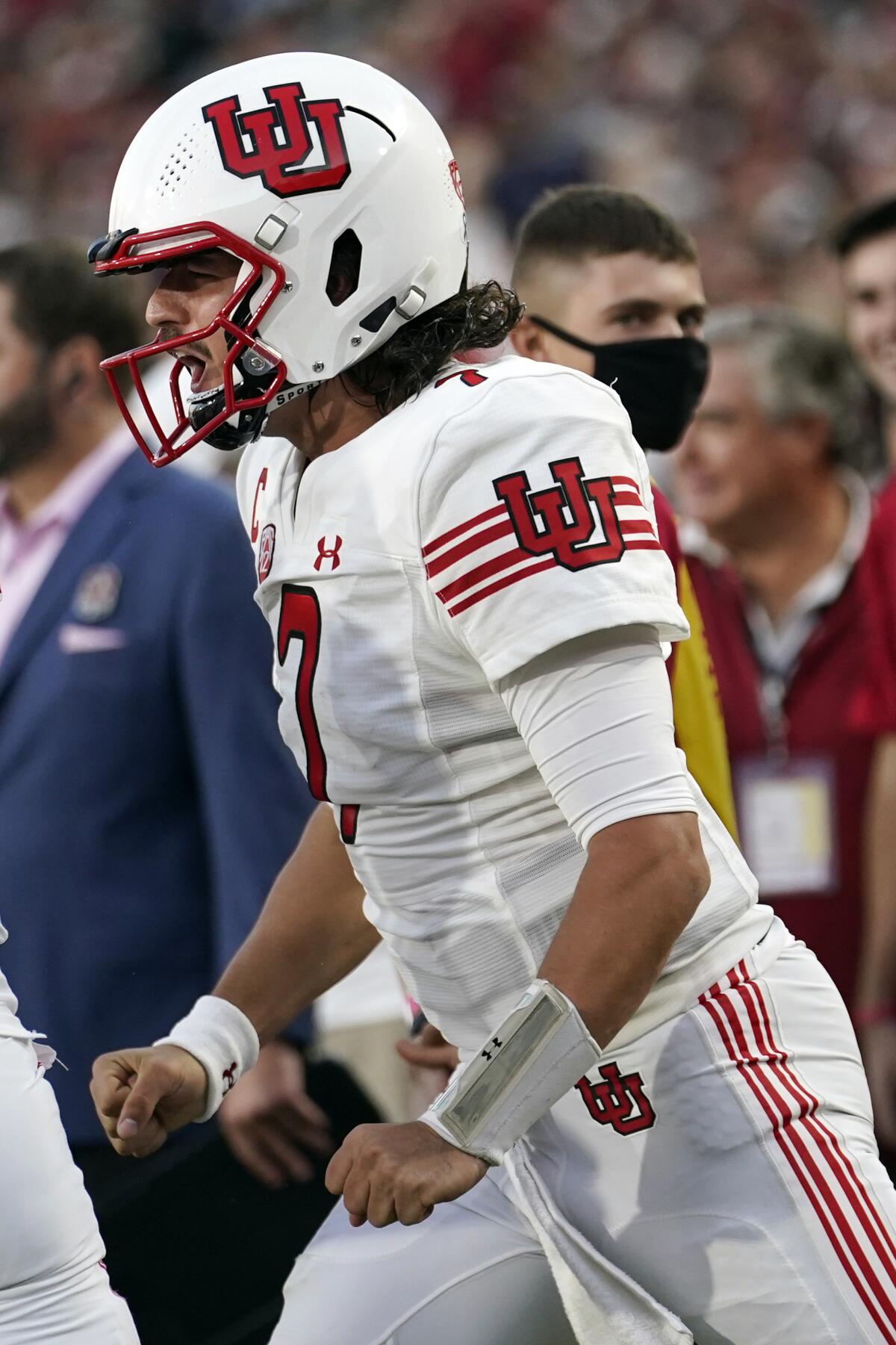
The Trojans’ offensive line was bullied up front, leaving Slovis to run for his life. While Utah (3-2, 2-0) took advantage of nearly all of its opportunities — at one point scoring touchdowns on five of six drives — USC managed to squander most of its chances.
USC came out of the gate determined to recapture the offensive balance it found last week in its win at Colorado. It threw screen after screen, dinking and dunking to get the offense in rhythm. It got London going early with five catches in the first seven minutes. It even kept with the ground game, handing off to Keaontay Ingram and Darwin Barlow 10 times in the first quarter.
Seth Small made a field goal as time expired as Texas A&M beat top-ranked Alabama 41-38, while No. 3 Iowa rallied for a 23-20 win over No. 4 Penn State.
But after three trips into Utah territory, USC still had little to show for its efforts. An eight-play drive stalled … then, an 11-play drive … then a 12-play drive. Unable to take advantage on the doorstep of the end zone, the Trojans settled for two short-range field-goal attempts, but only made one, as Parker Lewis missed his first kick in 11 tries this season.
It would take a short Utah punt, a short field for USC and a potential Heisman Trophy-contending wideout to finally find pay dirt. Even then, as London caught a swing pass in space, it took a hurdle between two defenders for him to score from 20 yards out, briefly giving the Trojans a lead. It wouldn’t last long. Utah’s flea-flicker left USC scrambling, and the Trojans never found their footing again. Two late scores — from Vavae Malepeai and Malcolm Epps — would only disguise the beating.
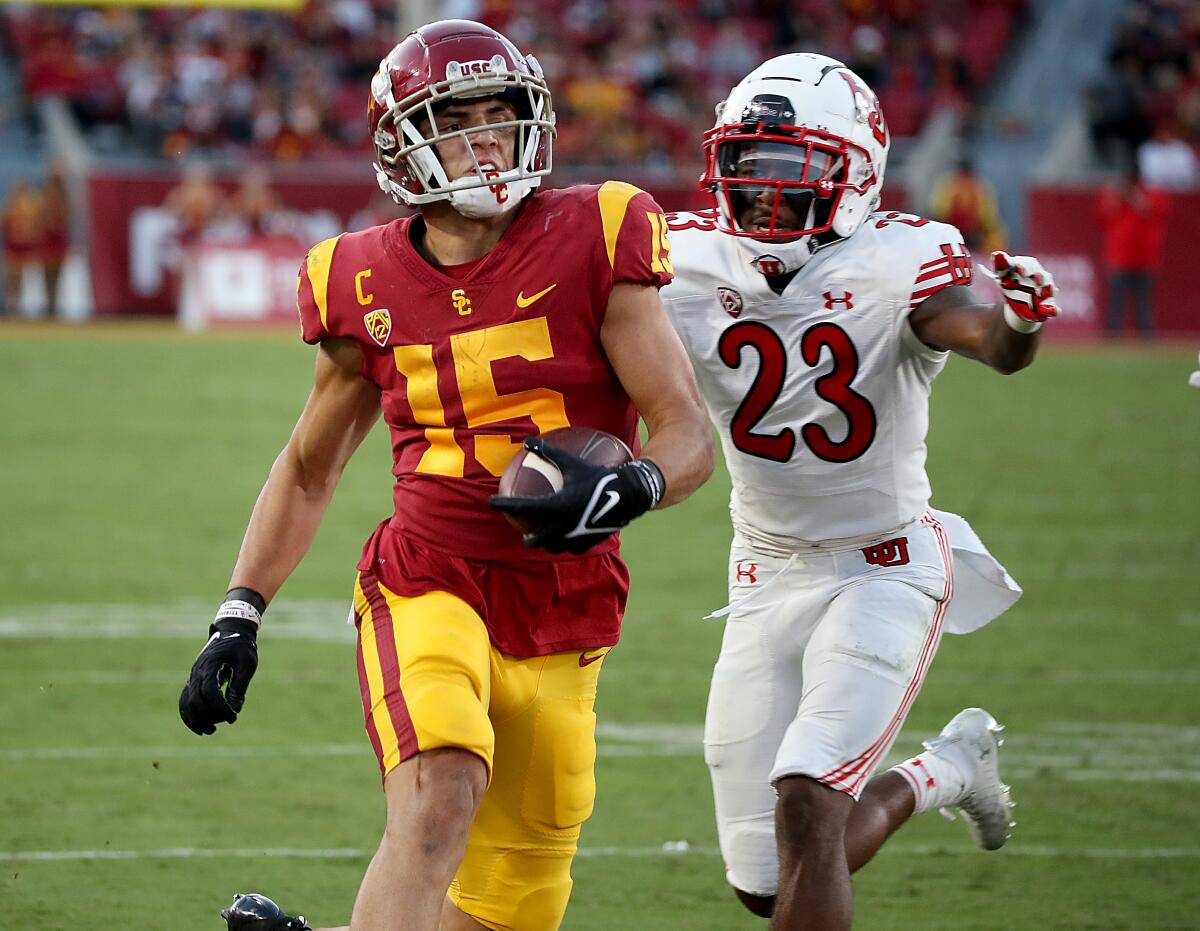
By the second half, as Utah opened with two more touchdowns in two drives, it even pulled back from its pummeling.
USC would wind up with more yards (493 to 486), more plays (78 to 63) and more time of possession. But when the dust had settled and history had been made, it was USC, for the first time in 105 years, that would walk off with its heads hanging once again.
“The guys fought to the end,” Williams said. “But that’s not good enough — at all.”
More to Read
Go beyond the scoreboard
Get the latest on L.A.'s teams in the daily Sports Report newsletter.
You may occasionally receive promotional content from the Los Angeles Times.

